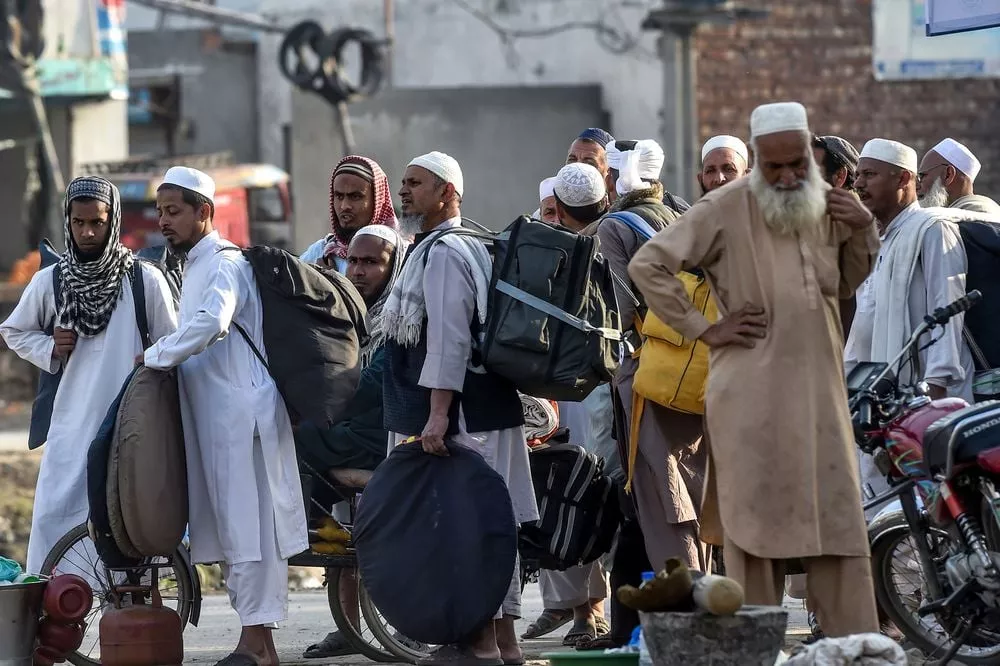27% of Pakistan's Covid-19 cases linked to Raiwind Ijtima: report
Mass religious gatherings across Asia spark coronavirus clusters, reports Bloomberg
At least 2,258 people who attended a religious mass gathering in Raiwind -- a town located in Lahore's suburbs -- have been tested positive for Covid-19 so far, which accounts for around 27 per cent of the country's total coronavirus cases.The nationwide tally of coronavirus patients stands at 9,565 with 198 deaths.
The authorities are now tracking around 70,000 people who attended the event hosted by the Tableeghi Jamaat.
The five-day annual gathering -- which began before Pakistan’s lockdown was implemented -- was attended by as many as 70,000 including 3,000 travelers before it was cut short, police officer Ghazanfar Shah told Bloomberg by phone.
Religious groups have been linked to virus hotspots around the world. An obscure church in South Korea attracted global attention after being linked to a sudden spike in coronavirus infections that accounted for about 5,200 confirmed cases in February. Singapore later banned the local activities of the South Korean sect.
Governments have long struggled to deal with religious sensitivities, especially during a crisis like a pandemic, Burzine Waghmar, a member of the Centre for the Study of Pakistan at SOAS University of London, said by phone on Monday.
No faithful, no cash: Lockdown proves critical for German mosques
“There are those itching to make political capital out of it by stating that they are talking about their basic fundamental rights to worship,” Waghmar said. “Religion is always a sensitive issue,” he said, noting that in Pakistan, such groups were a “force to be reckoned with.”
The Tablighi Jamaat gatherings were also at the center of a spike in infections in neighbouring India. Devotees from around the country, as well as Indonesia and Malaysia, attended an event in the capital New Delhi, also held in mid-March, that’s so far been linked to 4,300 infections.
In Malaysia, authorities linked a cluster of coronavirus cases to a similar event that ran from February 27 to March 1 and was attended by about 16,000 people at a mosque near Kuala Lumpur. That gathering is still the source of the biggest cluster in Malaysia, with 1,946 confirmed cases out of the country’s 5,425 infections. Singapore and Brunei subsequently reported cases that could be traced back to the Malaysia gathering.
The first wave
Pakistan’s first wave of cases came from pilgrims who returned from Iran, one of the worst-affected nations. Since then, about 78% of total cases have come from those two religious groups, PM’s aide on health Zafar Mirza said in a televised speech last week.
Mufti Najeeb Khan, a prominent follower of Tablighi Jamaat, said the March event was “cut short after the government instructions came for a lockdown.” Khan added, “If there were clear instructions, the event would not have happened.”
The group has since voluntarily converted many of their own places into quarantine facilities across Pakistan’s towns and villages, Khan said.
Pakistan extended its lockdown till the end of April, taking the movement restriction to about six weeks, but reopened some industries to contain the economic damage and prevent more people falling into poverty. The nation’s economic growth is expected to contract for the first time in 68 years.
Still, the government decided to reopen mosques on April 18 despite most nations keeping places of worship closed. People will stand six feet apart, instead of the regular practice of standing shoulder to shoulder, President Arif Alvi said in messages on Twitter.
This article originally appeared on Bloomberg


COMMENTS
Comments are moderated and generally will be posted if they are on-topic and not abusive.
For more information, please see our Comments FAQ